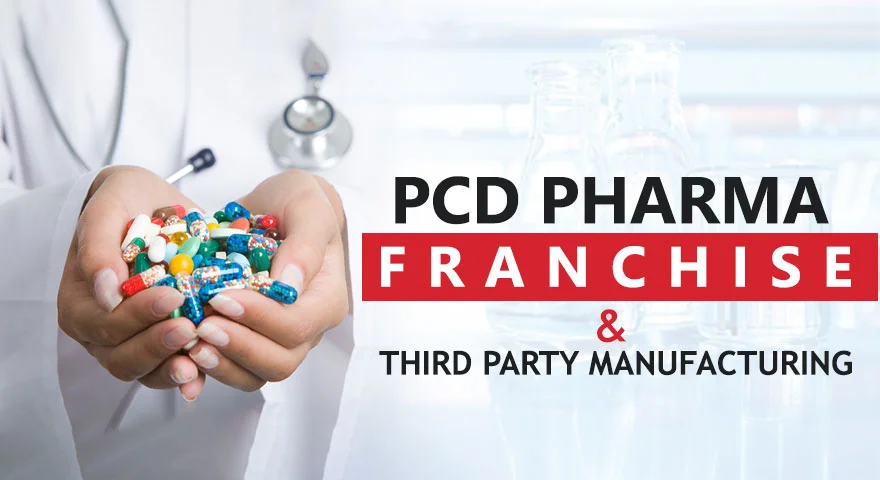Franchise vs PCD vs Third Party Manufacturing: Which One to Choose?

Exploring the Franchise Model
The pharmaceutical industry in India is witnessing unprecedented growth. With rising healthcare awareness, increasing demand for quality medicines, and government initiatives encouraging domestic production, new entrepreneurs have a wealth of opportunities. However, success in this dynamic market depends heavily on choosing the right business model. The three most common paths for pharma entrepreneurs are the Franchise Model, PCD (Propaganda-Cum-Distribution) Model, and Third-Party Manufacturing. Each model offers distinct advantages, investment requirements, operational dynamics, and long-term growth potential.
At VTV Formulations, we have supported numerous entrepreneurs in understanding and selecting the model that best suits their goals. By leveraging high-quality, WHO-GMP-certified products and expert guidance, our partners are able to focus on sales, marketing, and brand development while ensuring regulatory compliance and product quality. Understanding the nuances of each model is crucial to building a sustainable, profitable business in the pharmaceutical sector.
What is a Franchise Model?
The Franchise Model is ideal for entrepreneurs seeking a structured, low-risk entry into the pharmaceutical market. In this model, an entrepreneur partners with an established pharmaceutical company and gains the rights to market and distribute its products within a defined territory. The franchisor provides a portfolio of products, marketing tools, training, and guidance, while the franchisee primarily focuses on sales and distribution.Partnering with a reputable company like VTV Formulations ensures immediate brand credibility. Customers and healthcare professionals are more likely to trust a franchise operating under a recognized brand, which accelerates business growth. For first-time entrepreneurs, this association minimizes the learning curve and provides a reliable support system for operational challenges.
Advantages of Franchising
Franchising offers multiple benefits that make it an attractive option for new entrants:
- Established Brand Recognition : Operating under a trusted name reduces marketing challenges and builds instant credibility.
- Structured Support : Franchisees receive guidance in sales, territory management, and promotional strategies.
- Operational Ease : The parent company handles product development, packaging, and regulatory compliance, allowing franchisees to focus on growth.
- Reduced Risk : Operational and regulatory risks are partially shared with the parent company, making it safer for first-time entrepreneurs.
Challenges of the Franchise Model
While franchising is advantageous, entrepreneurs must consider its limitations. Limited autonomy in pricing, branding, and promotional activities can be a constraint. Franchisees must maintain performance standards to retain territorial rights. However, for those seeking guidance and structured support, franchising remains a dependable path to success.
Who Should Choose a Franchise?
This model is suitable for entrepreneurs who prefer guidance, have moderate investment capacity, and value stability and credibility. By partnering with VTV Formulations, franchisees can focus on building relationships with healthcare professionals and retailers while leveraging the company’s product portfolio and marketing expertise.

Understanding the PCD Model
What is PCD (Propaganda-Cum-Distribution)?
The PCD Model offers more independence than a franchise. Entrepreneurs receive monopoly rights in a specific territory, allowing them to sell and promote products without competition from the same company. While the parent company supplies the products and may provide marketing support, the PCD partner handles client relationships, promotional campaigns, and sales strategy independently.
Advantages of PCD
The PCD model balances independence with support, making it ideal for small investors and first-time entrepreneurs:
-
Territorial Monopoly : Exclusive rights in a defined area ensure minimal competition from the same company.
-
Lower Initial Investment : Entrepreneurs can start with smaller stock and scale operations gradually.
-
Operational Flexibility : Partners can customize marketing campaigns, promotional materials, and sales strategies based on local market dynamics.
-
Learning Opportunity : PCD allows hands-on experience in sales, distribution, and market research, preparing entrepreneurs for larger-scale operations.
Challenges in PCD
PCD requires active management of marketing, client acquisition, and sales. Unlike a franchise, there is limited operational guidance, so success depends heavily on the entrepreneur’s initiative, networking skills, and business acumen. Entrepreneurs must also ensure timely stock management and maintain quality standards to protect their reputation.
Who Should Opt for PCD?
PCD is best suited for newcomers who want to start small, understand market behavior, and gain operational experience. With VTV Formulations as a partner, entrepreneurs gain access to high-quality, compliant products, which enhance credibility while retaining the flexibility to implement their own strategies. Many successful PCD entrepreneurs later expand territories or transition into third-party manufacturing to establish their own brand.
VTV Formulations and PCD Opportunities
At VTV Formulations, PCD partners are supported with a wide range of WHO-GMP-certified products, marketing materials, and guidance on sales growth. This enables entrepreneurs to focus on client relationships and expansion while ensuring consistent product quality and regulatory compliance.
The Third-Party Manufacturing Model
What is Third-Party Manufacturing?
Third-party manufacturing is a production-focused model where entrepreneurs outsource the manufacturing process to a certified company like VTV Formulations. The manufacturer handles formulation, production, packaging, and regulatory compliance, while the entrepreneur markets the products under their own brand. This model allows full brand ownership and the ability to build a unique identity in the market.
Advantages of Third-Party Manufacturing
Third-party manufacturing is ideal for entrepreneurs aiming to build their own brand and scale efficiently:
- Full Brand Ownership : Entrepreneurs have complete control over branding, packaging, and marketing strategies.
- High-Quality Assurance : Partnering with a reputable manufacturer ensures compliance with GMP standards and regulatory requirements.
- Cost-Effective Scaling : Production is outsourced, eliminating the need for heavy infrastructure investment.
- Focus on Market Growth : Entrepreneurs can focus on branding, distribution, and client relationships while leaving production to experts.
Challenges of Third-Party Manufacturing
This model requires higher responsibility and expertise. Entrepreneurs must manage marketing, distribution, and sales independently. While the risk is higher, the potential returns and brand equity are also significantly greater. Mismanagement of marketing or distribution could affect brand reputation, so careful planning is essential.
Who Should Choose Third-Party Manufacturing?
Entrepreneurs with experience in marketing, business development, or pharma operations benefit most from this model. Partnering with VTV Formulations ensures access to high-quality products, timely production, and regulatory compliance, allowing entrepreneurs to focus on building a strong brand and expanding market presence.
VTV Formulations’ Support in Third-Party Manufacturing
VTV Formulations provides end-to-end third-party manufacturing solutions, including product formulation, packaging, regulatory documentation, and timely delivery. Our partners gain the assurance of quality, compliance, and reliable supply, enabling them to scale their business without operational bottlenecks.
Choosing the Right Model for Your Pharma Business
Aligning Your Goals with the Right Model
Choosing between Franchise, PCD, and Third-Party Manufacturing depends on objectives, investment capacity, and operational expertise:
- Franchise : Ideal for entrepreneurs seeking structured guidance, brand support, and moderate investment.
- PCD : Suited for small investors who want independence, monopoly rights, and hands-on learning.
- Third-Party Manufacturing : Best for entrepreneurs aiming for full brand ownership, scalability, and long-term growth.
Industry Trends and Opportunities
India’s pharmaceutical sector continues to expand, fueled by rising healthcare needs, increasing exports, and government support for domestic production. Franchise and PCD models are excellent for steady growth, while third-party manufacturing allows entrepreneurs to build brand equity and long-term profitability.
The Role of VTV Formulations in Entrepreneurial Success
Partnering with a trusted manufacturer like VTV Formulations provides entrepreneurs with high-quality products, marketing guidance, and compliance support. Whether starting as a franchisee, PCD partner, or third-party brand owner, our team ensures partners have the resources and support needed to succeed in the competitive pharma market.
Conclusion
There is no one-size-fits-all model in the pharmaceutical industry. The choice between Franchise, PCD, and Third-Party Manufacturing depends on your goals, experience, and investment capability. By understanding the advantages and limitations of each model and partnering with VTV Formulations, entrepreneurs can build a sustainable, profitable, and scalable pharma business. Strategic planning, high-quality products, strong partnerships, and consistent effort are key to long-term success. Choosing the right model lays a solid foundation for growth and a strong presence in India’s dynamic pharmaceutical sector.
Explore Related Blogs
Stay informed with our curated selection of similar blogs, offering expert perspectives on pharmaceutical trends, regulatory updates, and product innovations.
These articles are designed to help healthcare professionals, partners, and businesses stay ahead in an ever-evolving industry. Explore more to deepen your knowledge and make informed decisions.